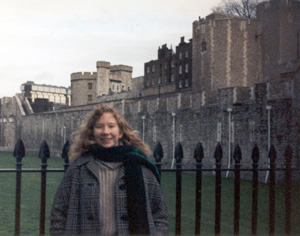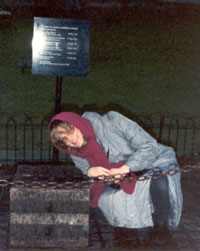Musings
an Online Journal of Sorts
By Alyce Wilson
August 15, 2005 - Voicing the Unsaid
Alyce at the Tower of London, 1990
Saturday night, after a long day of running around and shopping for various things we wanted to get to spruce up the apartment before our housewarming party, we watched one of The Gryphon's favorite movies, Almost Famous.
There's a line in there where Billy Crudup says rock is about what you don't say. It's about what's not said in the songs.
My poetry instructor used to say something similar. He used to tell us to leave some space between the lines so the reader could fill in the gaps. But he also said that poetry is about writing the thing that's hardest to say.
Over the years, some of my most emotional experiences have been the very ones I don't write about, perhaps because writing about them makes them too real. And yet, those are the experiences that leap out in vivid color in my mind, rehearsed again and again in mind's view, while the experiences I do write about, once expelled onto paper, seldom cross my mind again.
And so I need to write some things about what's been happening in our world, so that I can divest them of their power.
On July
7, I had just returned from running morning errands. Isn't that usually
how things happen? Right when you don't expect it, in the middle of an
ordinary morning? Over IM, The Gryphon told me he knew what all the newscasts
would be about today. I leaped on CNN.com,
and there it was in letters that might have been 50 feet high: "LONDON
ATTACKED."
London. I love that city and have since before I visited
it in 1990. London to me was magical. I felt at home walking down
the streets. I have to believe some one of my ancestors passed through
those streets on their way from Scotland and Wales to the U.S. You could
feel the history coming out of the ancient stone walls. I drank in all
the sights and sounds, and the people I saw there. It was so exciting
to see with my own eyes the many places I'd heard about and visited in
my imagination. I threw a copper coin in the creek that runs by Westminster
Abbey, having been told that means I'll return some day.
When we were there we stayed at a hotel in an old boarding house in Earl's Court. We made frequent use of the Piccadilly Line, the one that experienced the worst bombing. After the shock hit and the first wave of tears fell, I wondered if any of the people who'd ridden on that train with me 15 years ago were among the dead.
Then I became so angry in my grief, thinking, "How stupid. How stupid to think that, by lashing out and causing pain to strangers, ordinary folks, that you could change anything for the good?"
It wasn't until later in the day I began to feel a bit better, because a friend of The Gryphon's sent a link to a blog where Brits were giving their personal responses. Most of them were dryly witty, with observations such as the fact that the local shops were running out of cake. Or the fact that it just meant they'd be buying a bicycle the next day.
The first time The Gryphon and I took the train into the city, as we do every couple weeks, to have breakfast before he heads to work. On the way back home I check the mail for Wild Violet. Even more so than normal, I was checking out the other passengers, wondering how many of them were nervous and afraid, while at the same time resentful for feeling that way.
But there's nothing extraordinary about these emotions. We've all felt them, to one degree or another. We've seen so much of it in recent years that it's easy to forget the days our fears followed a different path: the Soviet Union and nuclear holocaust. If you'd like a refresher watch War Games, which encapsulates the mindset of the 1980s Cold War.
We no longer fear the catastrophic. We fear the minute, the deadly strike close to home. But this, too, is nothing new. And when you think about it, anything can happen to you at any time, no matter where you are: at home or driving your car. If you lived in fear of every single thing that could happen, you'd spend all your time worrying and none of it living.
One of the things we visited in London was the popular tourist spot, the Tower of London, famous as both the first royal residence and site of some of the most infamous executions and treacheries. We were guided through by a docent who pointed out the wall where people saw the ghost of Saint Thomas a Beckett dancing on the wall. She showed us the tower where they found the two dead princes buried under the stairs. My college roommate, who like me has a twisted sense of humor, had me photograph her with her head on the very block where Anne Boleyn lost hers.
I wrote about those things, but I didn't write about one small moment that still gives me chills. We were in the Mortar Room in the White Tower, an unassuming room in the basement. Cement floor, armaments displayed in rows on the white walls. If you stand in the middle of that floor, you can look down and see an ordinary gray stone. The engraving proclaims, and I paraphrase, "On this spot in 1974, one person was killed and 41 injured in a bombing attributed to the IRA." My heart chilled, and the walls seemed to close in. I had to leave the room.
As a condition of the trip, which was organized by the University Scholars Program, we had to work on a research paper. I did some research at the archives at ITV, and when I walked in I was met at the front counter by a guard. He swept my manila folder of notes with a wand. "Have to make sure there's no bomb in there," he said cheerily.
Yet, for some reason, we often forget about our earlier fears. We prefer to believe the past was safer, more comforting. Perhaps because we survived whatever threats existed in those days. Knowing this, we can project ourselves into the future, to a time when we can say, "I had so many foolish fears back then, and they turned out to be nothing."
I'm tired. It's after 1 a.m., and The Gryphon's downstairs watching Battlestar Galactica. I went to bed after I started falling asleep in the couch, but these thoughts started circulating and I realized that if I don't get them down now, they'll keep floating around, floating around, hungry ghosts of thought.
I heard recently that one of the most requested books among terrorist suspects at Guantanamo Bay, Cuba, is the new Harry Potter book. None of the commentators who remark on this can understand it, and I can't say I do either. But I do know that we laugh at it because it is so unexpected: that the people we see as evil incarnate could have a human side. It is unthinkable that we could have anything in common.
Fear is
not a recent thing. Fear has always been there. The world has always been
a fractious thing. That is ordinary. That is how it is. What makes us
keep going, buying bicycles and chocolate cake, is our refusal to accept
that fear is our destiny. Instead, we keep believing, as a copper coin
in a stream symbolizes a future adventure, that we are destined for a
brighter, more peaceful future.
Moral:
Words are one of the most powerful coping mechanisms in existence.
Copyright
2005 by Alyce Wilson
What
do you think? Share your thoughts
at Alyce's message board (left button):
![]()
![]()



